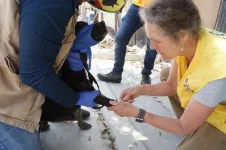(Press-News.org) A new genomic study reveals how Indigenous traditional farming practices have shaped the evolution of manioc – one of the world’s most important staple crops – for the better. The domestication of plants and the rise of agriculture were transformative events in human history. Today, a few staple crops provide most human calories, including manioc (cassava or yuca), a vital root crop that sustains nearly a billion people across the tropics. Although it ranks as the world’s seventh most significant crop, manioc is primarily cultivated on small farms. The plant’s domestication traces back to the southwestern Amazon, where its wild ancestor propagated via seeds. However, human cultivation, which became widespread throughout South and Central America during the mid-Holocene (~7000 years ago), led to manioc being sustained by clonal propagation through stem cuttings. To better understand the genetic consequences of traditional manioc cultivation practices, Logan Kistler and colleagues analyzed 573 manioc genomes from across the Americas, including newly sequenced samples from herbarium specimens, archaeological sites, and wild relatives. Kistler et al. also sequenced 19 manioc lineages contributed by a Waurá Indigenous community in Brazil’s Xingu region, where farmers grow manioc using ancestral methods. The findings revealed a surprising pattern in manioc – all cultivated varieties, worldwide, share vast regions of identical DNA. Using a novel molecular clock method, the authors show that these genetic segments have circulated for millennia, likely a consequence of human farming methods. Despite manioc's extensive genetic interconnectedness, it sustains an exceptionally high degree of genetic diversity, the authors also report. Individual plants harbor substantially greater genetic variation within their own genomes than is observed between separate individuals. According to Kistler et al., these patterns have been actively maintained through human selection, as farmers have historically favored robust plants with high genetic diversity, effectively counteracting the genetic decline typically associated with long-lived clones. “The unexpected pattern of diversity in manioc highlights the important role of traditional management strategies that have shielded clonal populations from risks introduced through thousands of years of propagation,” say Kistler and colleagues.
END
Indigenous farming practices have shaped manioc’s genetic diversity for millennia
Summary author: Walter Beckwith
2025-03-06
ELSE PRESS RELEASES FROM THIS DATE:
Controlling electrons in molecules at ultrafast timescales
2025-03-06
Scientists at YOKOHAMA National University, in collaboration with RIKEN and other institutions in Japan and Korea, have made an important discovery about how electrons move and behave in molecules. This discovery could potentially lead to advances in electronics, energy transfer, and chemical reactions. Published in the Journal, Science, their study reveals a new way to control the distribution of electrons in molecules using very fast phase-controlled pulses of light in the terahertz range.
Atoms and molecules contain negatively charged electrons that usually stay in specific energy levels, like layers, ...
Tropical forests in the Americas are struggling to keep pace with climate change
2025-03-06
Embargoed until 14:00 US Eastern Time, Thursday 6 March 2025
Tropical forests in the Americas are struggling to keep pace with climate change
Tropical rainforests play a vital role in global climate regulation and biodiversity conservation. However, a major new study published in Science reveals that forests across the Americas are not adapting quickly enough to keep pace with climate change, raising concerns about their long-term resilience.
The research, led by Dr. Jesús Aguirre-Gutiérrez from the University of Oxford’s Environmental Change Institute (ECI), involved over 100 scientists ...
Brain mapping unlocks key Alzheimer’s insights
2025-03-06
Researchers from The University of Texas at Arlington and the University of California–San Francisco have used a new brain-mapping technique to identify memory-related brain cells vulnerable to protein buildup, a key factor in the development of Alzheimer’s disease, an incurable, progressive brain disorder that slowly destroys memory and thinking skills.
In Texas, nearly half a million people live with Alzheimer’s disease, a form of dementia that costs the state approximately $24 billion in caregiver time, according to the Texas Department of State Health Services. Texas ranks fourth in the nation for Alzheimer’s cases ...
Clinical trial tests novel stem-cell treatment for Parkinson’s disease
2025-03-06
A recently launched Phase 1 clinical trial at Mass General Brigham is examining the safety and feasibility of a groundbreaking treatment approach for Parkinson’s disease in which a patient’s stem cells are reprogrammed to replace dopamine cells in the brain damaged by the disease. The first-of-its-kind trial of an autologous stem cell transplant, based on research and technologies invented and validated preclinically at McLean Hospital’s Neuroregeneration Research Institute (NRI), has enrolled and treated three patients at Brigham and Women’s ...
Awareness of rocky mountain spotted fever saves lives
2025-03-06
Rocky Mountain spotted fever is a bacterial infection spread by biting ticks to humans and dogs. Found on every continent except Antarctica, the infectious disease has been spreading since the early 2000s, most notably in Mexico and Brazil. Of the cases reported, more than half of infected people and dogs die.
A paper led by the University of California, Davis, highlights one of the most effective but often missing solutions to surviving this preventable, deadly disease: awareness. Most fatal cases stem from delays in diagnosis and treatment.
“The No. 1 thing that prevents human death from Rocky Mountain spotted fever is for everyone at high risk to know ...
Breakthrough in noninvasive monitoring of molecular processes in deep tissue
2025-03-06
The prestigious journal Advanced Materials recently published a groundbreaking study introducing a new method for monitoring molecular processes deep within tissue. Developed at the Technion - Israel Institute of Technology, the innovation is expected to accelerate key advancements in personalized medicine, cancer diagnosis, and early disease detection. The research was led by Prof. Hossam Haick, postdoctoral fellow Dr. Arnab Maity, and Ph.D. student Vivian Darsa Maidantchik from the Wolfson Faculty of Chemical Engineering at the Technion. The study also involved Dr. Dalit Barkan, research assistant Dr. Keren ...
BU researcher named rising star in endocrinology
2025-03-06
(Boston)—Sun Lee, MD, MSc, assistant professor of medicine at Boston University Chobanian & Avedisian School of Medicine, has been awarded an American Association of Clinical Endocrinology (AACE) Rising Star in Endocrinology Award.
The honor is presented to a physician who is within 10 years of completing their endocrine fellowship and has demonstrated actionable outcomes in outstanding leadership, teamwork and/or innovation in support of AACE’s mission to elevate clinical endocrinology ...
Stressed New Yorkers can now seek care at Mount Sinai’s new resilience-focused medical practice
2025-03-06
The Center for Stress, Resilience and Personal Growth at Mount Sinai—a first-of-its-kind initiative launched in April 2020 at the height of the COVID-19 pandemic to address its psychosocial impact on Mount Sinai Health System’s workforce—is now offering confidential behavioral health treatment services to New Yorkers generally.
A team of clinical psychologists, psychiatrists, and licensed clinical social workers from the Center is now available to individuals 18 years and older who are interested in and could benefit from behavioral health treatment. Clinical services include cognitive behavioral therapy, ...
BU researchers uncover links between metabolism and aggressive breast cancer
2025-03-06
(Boston)—More than 120 million Americans suffer from diabetes or pre-diabetes. Triple-negative breast cancer (TNBC) is the most aggressive form of breast cancer, and TNBC patients with obesity-driven diabetes often have worse outcomes.
A new study by researchers from Boston University Chobanian & Avedisian School of Medicine helps explain why this happens and suggests a potential way to improve treatment for these patients.
At present, oncologists do not consider patients with breast cancer and obesity-driven diabetes differently in any significant way from patients with breast cancer who are otherwise healthy.
The new study, "Insulin Resistance Increases ...
Engineers took apart batteries from Tesla and China’s leading EV manufacturer to see what’s inside
2025-03-06
Two main manufacturers dominate the EV (electric vehicle) market: Tesla, which is most popular in Europe and North America, and BYD, which leads the Chinese EV market. However, both manufacturers have released limited data about their batteries, so the mechanical structure and characteristics of these battery cells has remained mysterious. To compare the batteries used by each manufacturer and better understand how EV batteries function overall, a team of researchers took one of each apart.
The results publish on March 6 in the Cell Press journal Cell Reports Physical Science and show that Tesla’s batteries prioritize high-energy density and performance, ...
LAST 30 PRESS RELEASES:
A promising potential therapeutic strategy for Rett syndrome
How time changes impact public sentiment in the U.S.
Analysis of charred food in pot reveals that prehistoric Europeans had surprisingly complex cuisines
As a whole, LGB+ workers in the NHS do not experience pay gaps compared to their heterosexual colleagues
How cocaine rewires the brain to drive relapse
Mosquito monitoring through sound - implications for AI species recognition
UCLA researchers engineer CAR-T cells to target hard-to-treat solid tumors
New study reveals asynchronous land–ocean responses to ancient ocean anoxia
Ctenophore research points to earlier origins of brain-like structures
Tibet ASγ experiment sheds new light on cosmic rays acceleration and propagation in Milky Way
AI-based liquid biopsy may detect liver fibrosis, cirrhosis and chronic disease signals
Hope for Rett syndrome: New research may unlock treatment pathway for rare disorder with no cure
How some skills become second nature
SFU study sheds light on clotting risks for female astronauts
UC Irvine chemists shed light on how age-related cataracts may begin
Machine learning reveals Raman signatures of liquid-like ion conduction in solid electrolytes
Children’s Hospital of Philadelphia researchers emphasize benefits and risks of generative AI at different stages of childhood development
Why conversation is more like a dance than an exchange of words
With Evo 2, AI can model and design the genetic code for all domains of life
Discovery of why only some early tumors survive could help catch and treat cancer at very earliest stages
Study reveals how gut bacteria and diet can reprogram fat to burn more energy
Mayo Clinic researchers link Parkinson's-related protein to faster Alzheimer's progression in women
Trends in metabolic and bariatric surgery use during the GLP-1 receptor agonist era
Loneliness, anxiety symptoms, depressive symptoms, and suicidal ideation in the all of us dataset
A decision-support system to personalize antidepressant treatment in major depressive disorder
Thunderstorms don’t just appear out of thin air - scientists' key finding to improve forecasting
Automated CT scan analysis could fast-track clinical assessments
New UNC Charlotte study reveals how just three molecules can launch gene-silencing condensates, organizing the epigenome and controlling stem cell differentiation
Oldest known bony fish fossils uncover early vertebrate evolution
High‑performance all‑solid‑state magnesium-air rechargeable battery enabled by metal-free nanoporous graphene
[Press-News.org] Indigenous farming practices have shaped manioc’s genetic diversity for millenniaSummary author: Walter Beckwith




